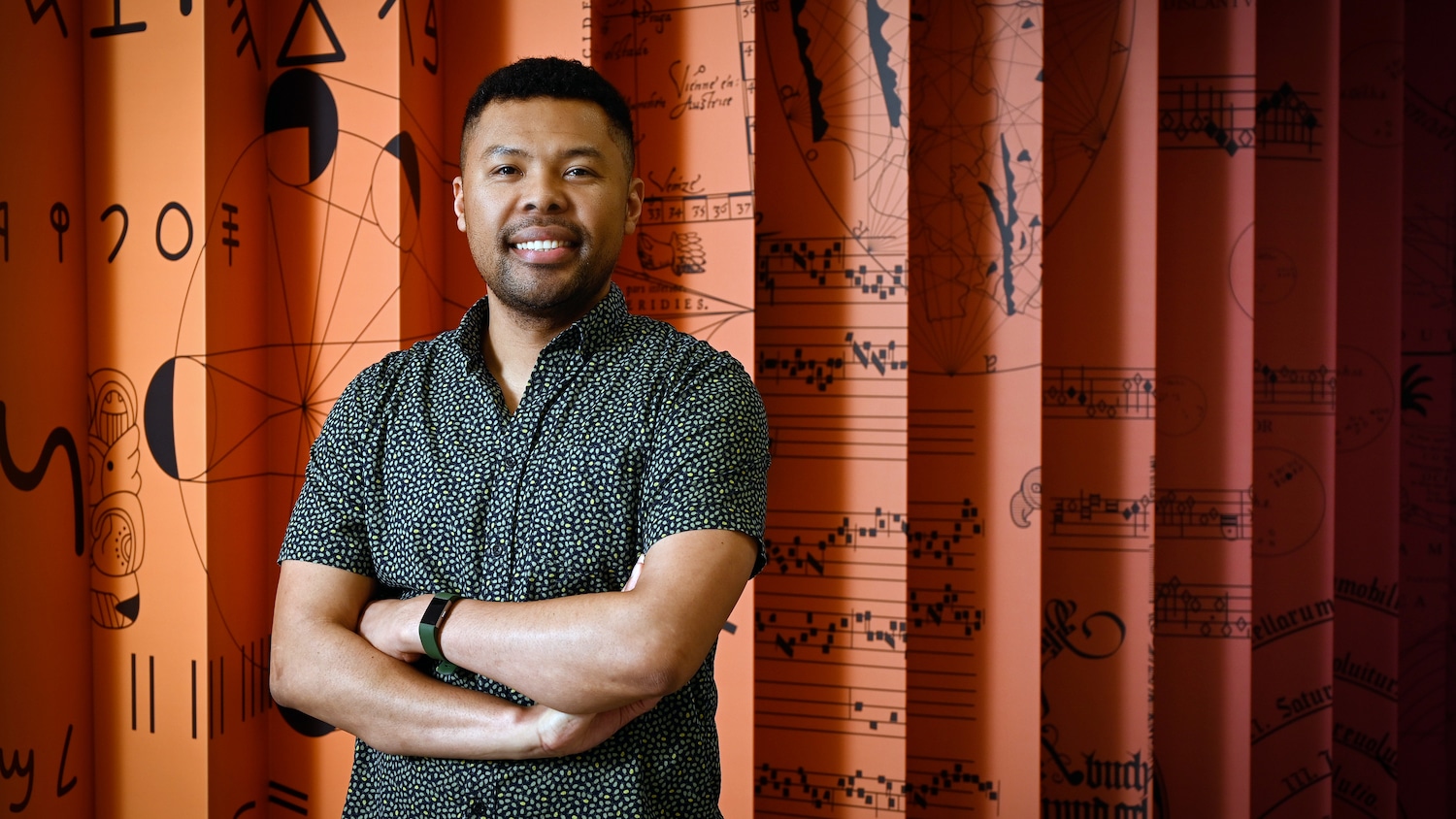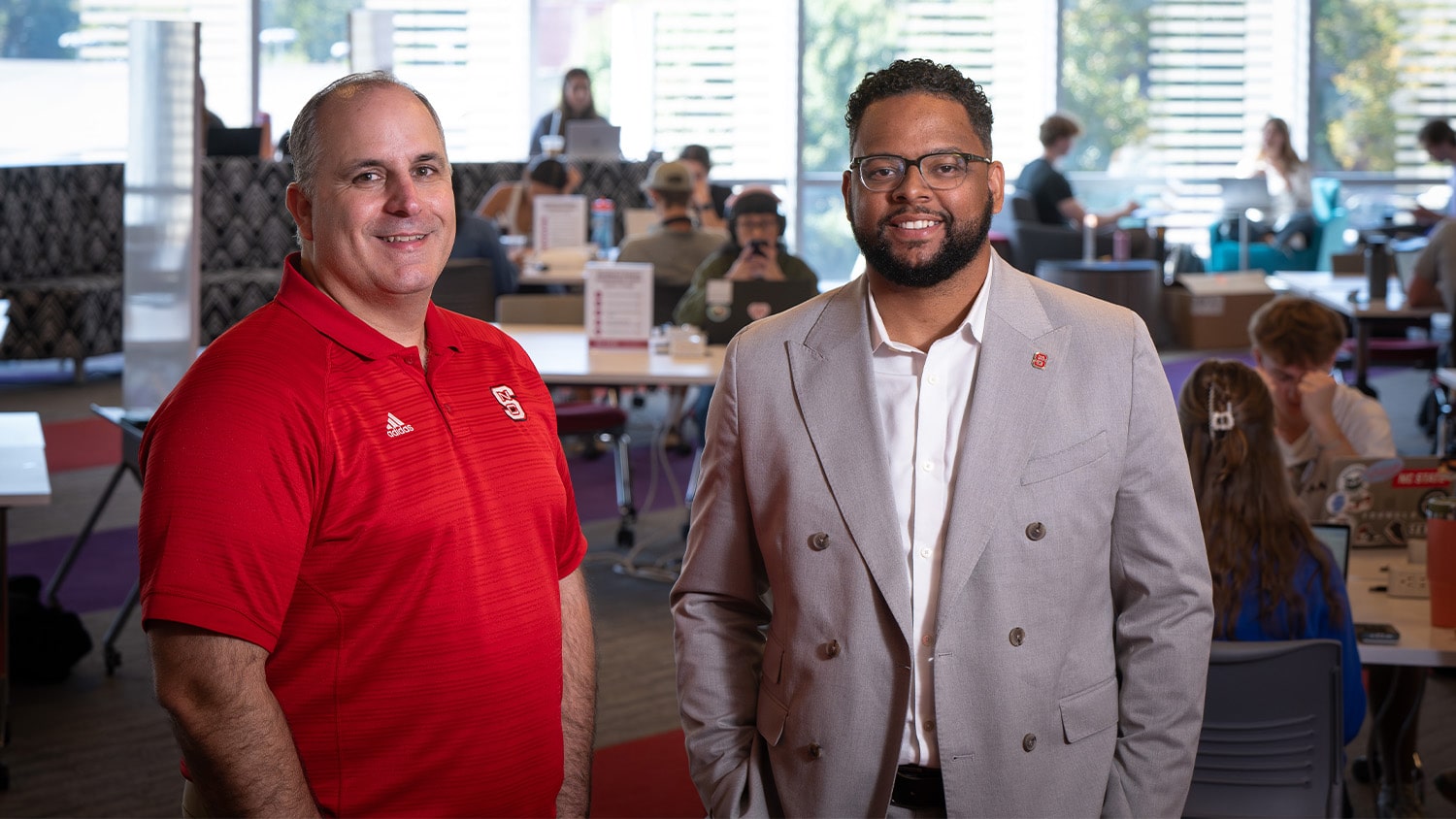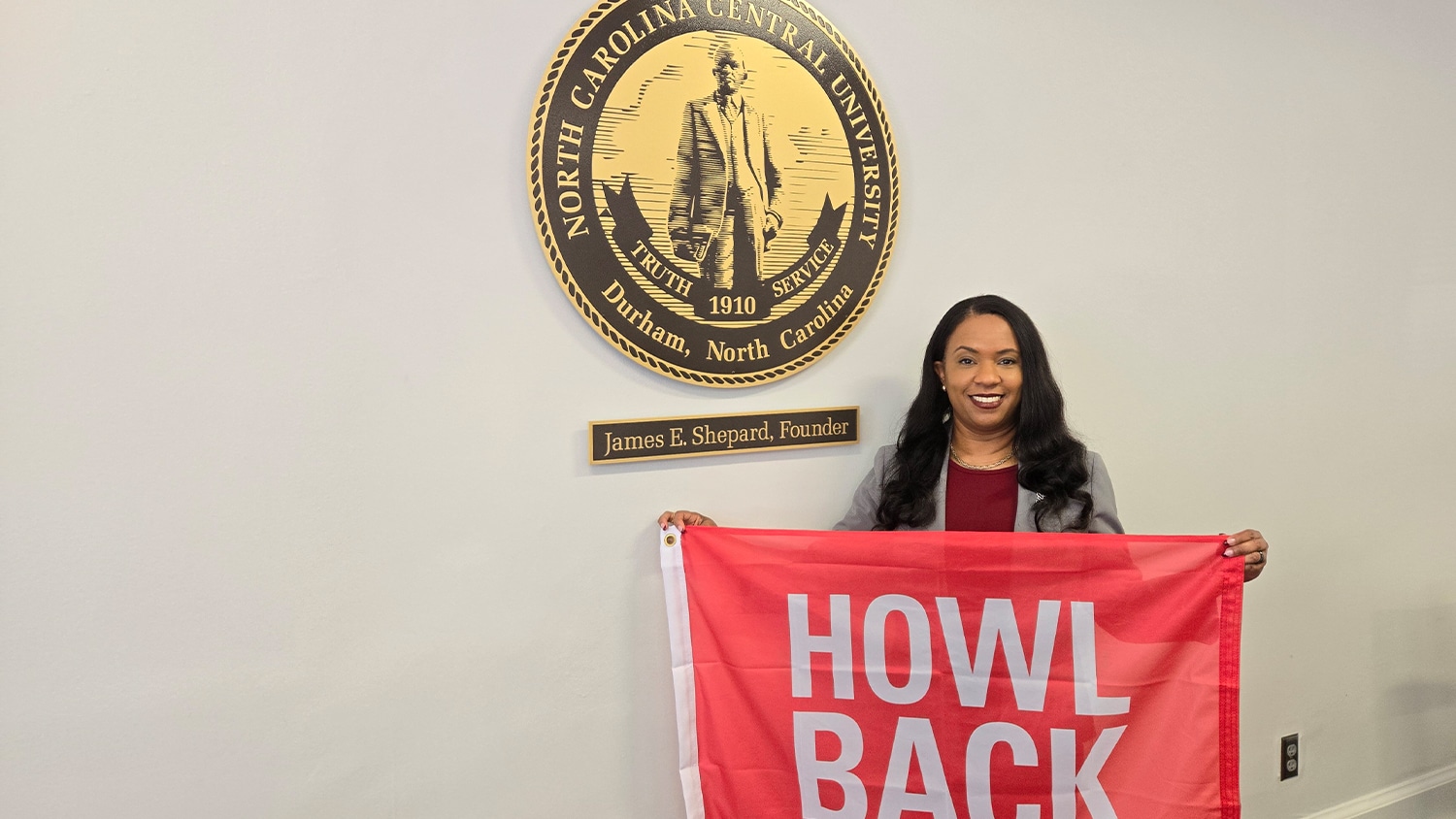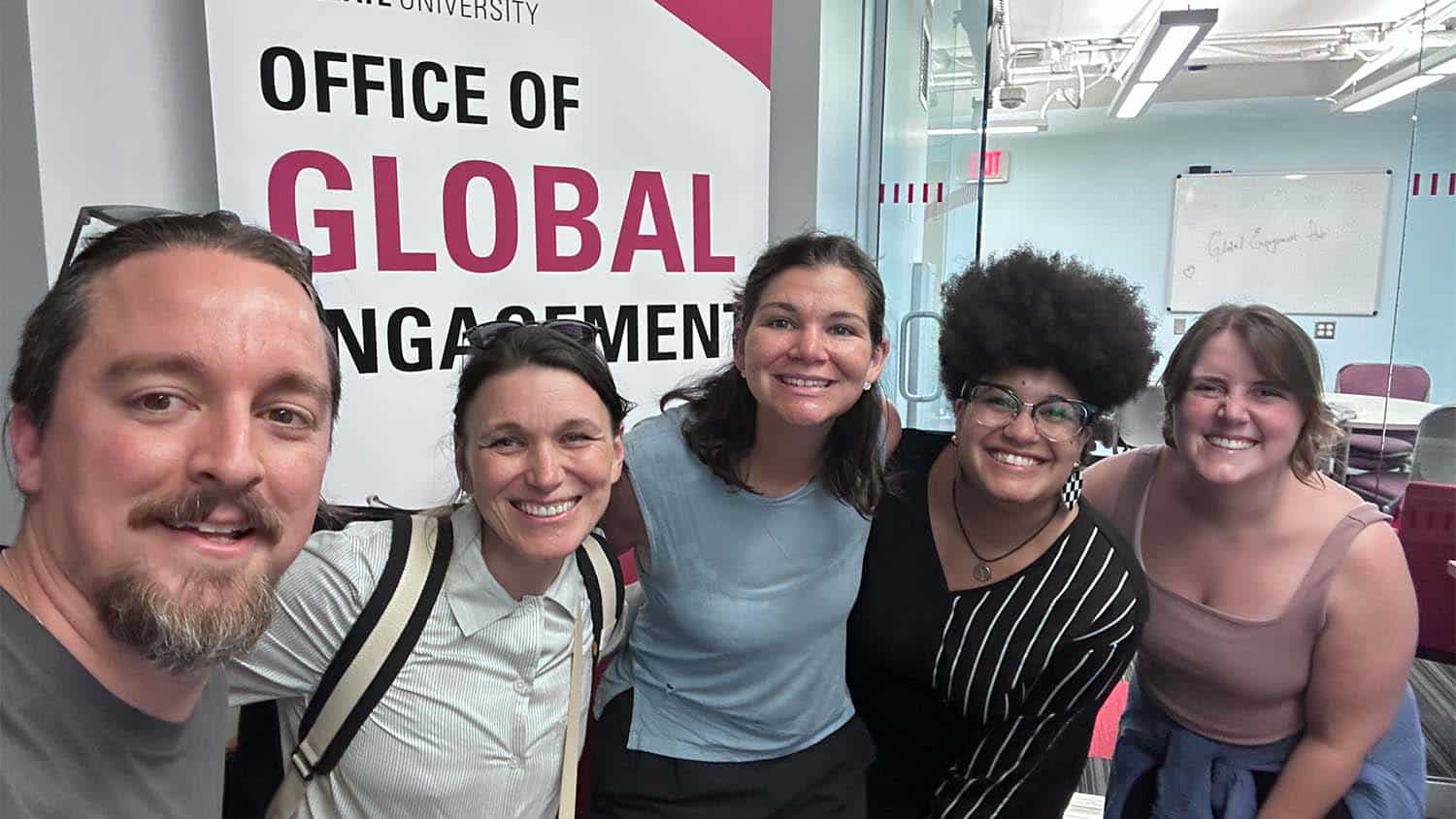Unheard History
Victor Betts is dedicated to uncovering and archiving the stories of our Asian and Asian American Wolfpack. Learn how he’s doing it — and so much more — as NC State’s student success librarian for Special Collections.

Since joining the Wolfpack in 2019 as an NC State University Libraries fellow, Victor Betts has committed his time to discovering and elevating the unheard histories of the Asian and Asian American members of the Wolfpack — and so much more.
Today, Betts serves as a student success librarian for Special Collections, where he pioneers ways of ensuring students and employees alike feel heard and represented by our university historical collections. Most recently that includes developing the Immersive Asian and Asian American Historical Timeline exhibit in celebration of Asian Pacific Islander South Asian American (APISAA) Heritage Month.
Joining Our Premier Library Staff
Ever since Betts earned his master’s degree in education, he’s been interested in research. Through the various student and academic affairs positions he held after graduating, he recalls discovering a passion for archival research, especially when centering the lives of underrepresented communities.
“Some of the partnerships I had been developing with faculty and students regarding their research and scholarship sparked my interest and made me miss research,” says Betts. “How can I get more involved in research, and closer in proximity to research, without the pressure of having to publish?”
This spark led him back for a second stint in graduate school, where he earned his master’s degree in library science. “I love diving into a specialized topic and learning all that I can,” he says.
When the opportunity later presented itself to work at NC State, Betts knew he couldn’t pass up working in a library system he had heard so much about. “I was really excited because in my graduate work, the NC State University Libraries had come up a lot as sort of the premier example of user experience and research technologies. It’s been a great experience so far.”
I love diving into a specialized topic and learning all that I can.
Betts’ day-to-day work might surprise some. His projects may take him all over campus one day, and deep into our archives in D.H. Hill Jr. Library the next. “I think people have misconceptions about what librarians do,” says Betts. “They might think we’re reading books all day. But no, I barely read books at work.”
In his role as student success librarian, he’s responsible for introducing students to archival research by making it approachable and accessible through archival literacy instruction. This often means he has to focus on campus outreach and engagement so he can meet students where they are.
“Community outreach and engagement are not just buzzwords for me,” says Betts. “They’re not just platitudes. I take great care in how I approach and engage with relationships so they are truly based on partnerships. And that takes time, effort and investment.” He says he’s made great strides in connecting with NC State’s four campus community centers, and he often works with students there.
Betts also initiated the Reparative Archival Description working group in the fall of 2020 to reexamine the way people and things are described in NC State’s archival materials. The project seeks to contextualize the language choices previously made or to update the descriptions when necessary to better reflect the communities they represent.
When asked what he’s been most excited about while working at NC State, Betts eagerly recounts his recent collaborative efforts to collect and uplift multicultural heritage across the university.
Piquing Historical Interest
The first project Betts was assigned at NC State led him to search for photographs of Justina Williams, the university’s first African American faculty member. This project became the catalyst for Betts finding a deep — and previously unknown — history of Asians and Asian Americans at NC State.
His thorough research on the topic led to the creation of NC State’s Asian and Asian American Historical Timeline, elevating the community’s rich history to an institutional level.
A top priority for his projects regarding Asians and Asian Americans is to recognize the diversity within the vast community. This year’s APISAA heritage month, led by the office of Multicultural Student Affairs and several student organizations, takes a similar approach, with events and the month’s theme focusing on unity within diversity.
Betts notes the importance of communal, collaborative work to accomplish these feats, and he emphasizes that none of his work is possible without it.
Betts emphasizes his interest in collecting and commemorating the experiences of our Asian and Asian American Wolfpack. There is immeasurable value to recording our histories, both retroactively and proactively, he says. “The most fulfilling part of my work is seeing students engage with it,” says Betts.
One memorable moment he recalls is when a student said her grandmother had been an employee at the university many years ago, but had never found her employee experience compelling enough to share. Betts encouraged the student to speak with her grandmother about sharing the story with his team. “Her experience working at NC State is important and it does matter,” he says.
Betts says that while the personal interactions he’s had are encouraging, so are the systemic changes he’s helped bring about, like the archival description working group and the improved access and approachability to the Libraries.
Student Success
Betts is a first-generation college student, so he understands the barriers students might be facing during their time on campus. This gives him an advantage when connecting with students and helping them transition into research. He says he is passionate about giving back in ways similar to how others helped him, and he cites how vital it feels for him to impart knowledge and insights for those who come after him.
When looking to his future, Betts intends to keep chipping away at barriers to student success and working to ensure all members of the Wolfpack feel represented in our collective history.
I want to be sure that how we remember our history is really inclusive.
“I’m really focused on equitable access to resources and services on campus, and access to historical texts and materials, especially those of marginalized communities,” says Betts. “Those voices were erased, not valued, or not given stories. We don’t hear the voices of Asian Americans, African Americans or Native Americans.”
The Asian and Asian American Historical Timeline is one example of how dedicated researchers can contextualize our history and provide a richer understanding for us all.
“If we look at the narrative of the university’s history, I want to make sure that we are centering those voices that we’re not thinking about, that are sort of invisible or in the shadows,” he says. “I want to be sure that how we remember our history is really inclusive.”


